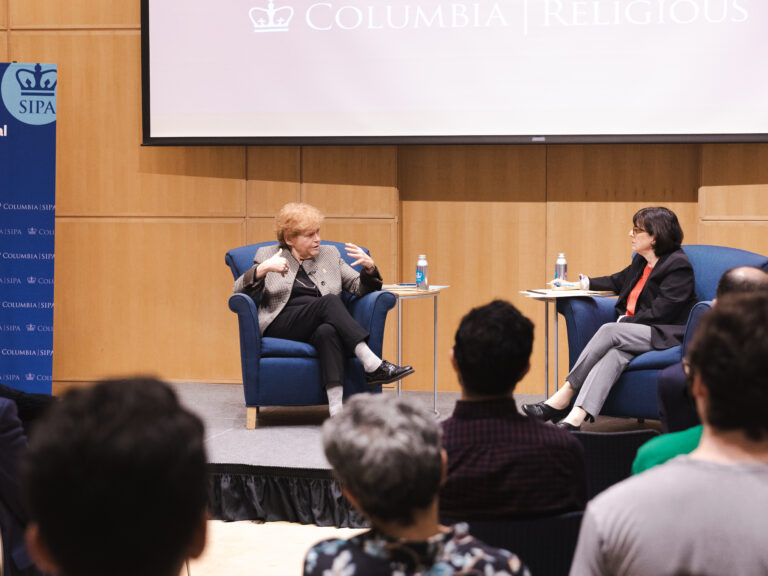Columbia SIPA hosted Ambassador Deborah Lipstadt on February 28 for a discussion on the rise of global antisemitism and its threat to democracy and stability around the world.
Lipstadt has served since 2022 as the US special envoy to monitor and combat antisemitism. She is also the founder of the Emory University Tam Institute for Jewish Studies, where she is the Dorot Professor of Modern Jewish History and Holocaust Studies.
As special envoy, Lipstadt leads efforts to advance US foreign policy to counter antisemitism across the globe. Traveling extensively outside the United States, she meets with Jewish communities, rabbis, and foreign officials to discuss ways to combat hate speech, discrimination, and prejudice.
“It’s imperative that we think of antisemitism as more than just — and I put ‘just’ in quotation marks — a threat to the welfare of Jews and the Jewish community,” Lipstadt told the audience at the Kraft Center for Jewish Student Life, which cosponsored the event with Columbia Religious Life. “It’s more than just that. It’s also a threat to democracy.”
Antisemitism is free-flowing, moving across every place on the political spectrum. It can come from left, right, center, center left, center right. It can come from Christians, it can come from Muslims, it can come from atheists, it can come from Jews. It is ubiquitous.— Ambassador Deborah Lipstadt
Identifying antisemitism is critical, Lipstadt explained, precisely because its presence can often serve as an early warning sign of democratic backsliding. She argued that “bad actors” — whether individuals, organizations, or autocratic governments — use antisemitism to undermine trust in democracies and make them seem like failed states. She also compared antisemitism to a “cooking spoon” being used to “stir up the pot” and make citizens feel like their governments cannot protect them.
“If you can make a democracy look like a place that isn’t such a great place… that can’t protect its citizens, that claims it has freedom but really doesn’t, that’s in [the bad actors’] interest,” said Lipstadt.
The hour-long discussion was moderated by SIPA Professor Ester Fuchs, who was appointed in November to lead the Columbia University Task Force on Antisemitism. The talk is one event in an ongoing series sponsored by Columbia Religious Life, the next of which will feature a talk on anti-Muslim hate.
Image
Ambassador Deborah Lipstadt speaks with a guest following her recent talk. [photo / Nick Hornedo]Lipstadt’s work as special envoy has become even more important since the October 7 attacks on Israel, as antisemitic incidents and rhetoric have surged in the United States and abroad. In the three months following October 7, antisemitic incidents in this country have more than tripled, according to the Anti-Defamation League. In New York City, acts of antisemitism more than doubled between 2021 and 2023. On college campuses, there have been more than 1,000 antisemitic incidents reported since October 7.
To define antisemitism, Lipstadt said the State Department uses a working definition from the International Holocaust Remembrance Alliance: “Antisemitism is a certain perception of Jews, which may be expressed as hatred of Jews.” She said IHRA also maintains a list of examples based on surveys of Jewish populations.
Lipstadt and Fuchs discussed the challenge of recognizing hate speech that is often presented in the guise of rationalist discourse.
“There are certain unique characteristics to antisemitism that make it different from the other prejudices,” Lipstadt said. She said the “conspiracy myth” that Jews control certain sectors of society, such as banks, media, or elections, is the cornerstone of antisemitism, and anyone who accepts it has “essentially given up on democracy.”
Another key characteristic of antisemitism is how commonplace it is, Lipstadt said. “It’s free-flowing, moving across every place on the political spectrum. It can come from left, right, center, center left, center right. It can come from Christians, it can come from Muslims, it can come from atheists, it can come from Jews. It is ubiquitous,” Lipstadt said.
“Rather than thinking of a spectrum right-left, I like to think of a horseshoe” where the two ends meet, she added.
Image
Guests filled the room at the Kraft Center for Jewish Student Life. [photo / Kevin Dale]Fuchs wrapped up the hour-long conversation by asking Lipstadt what can be done to address antisemitism on college campuses. The ambassador said that universities need to take the threat of antisemitism more seriously, and live up to their rules and regulations on hate speech.
“There’s a failure to understand, I think, and a failure to accept the fact that institutions whose raison d’etre, whose very reason for being is thinking and reaching for liberal acceptance and acceptance of all groups and being against injustice and all that, could themselves have fallen into antisemitic ways of thinking whether consciously or unconsciously,” Lipstadt said.
In response to audience questions, Lipstadt drew a distinction between questioning Israeli government policy and antisemitism. “Criticism of the state of Israel is not antisemitism, just like criticism of American policy is not anti-Americanism,” she said. But, Lipstadt added, that “if your criticism is not criticism of policy but a saying that the state of Israel has no right to exist… whatever your reason, then that is already coming close to the line.”
Lipstadt ended the discussion urging Jewish students to not live defensively. “I know it’s true, and I know it’s true not just on this campus, that Jewish students are afraid,” she said. “Some are living defensively wearing a baseball cap instead of a kippah.”
“But whatever degree you are, whatever degree you feel comfortable, don’t go underground.”
Watch the complete event

